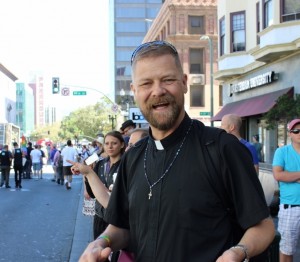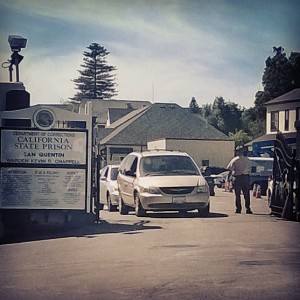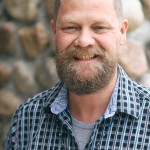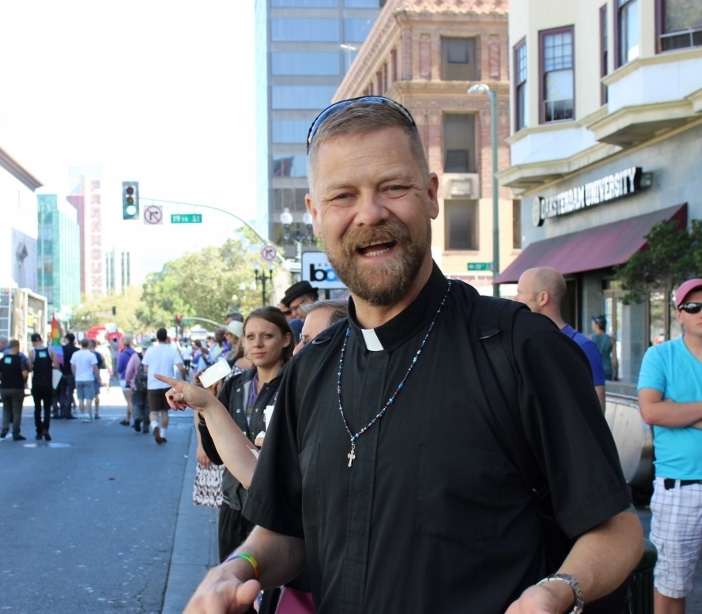Guest blog by Cary Bass-Deschenes, Proclaim member and First Call Candidate
In May I graduated from Pacific Lutheran Theological Seminary and am now awaiting the Holy Spirit to call me to a congregation or setting where I can share my gifts. Most days it has been an exercise in patience. Whereas a year ago the synod had a number of calls that were readily available when students graduated, this year congregations in transition all seem to be at different points in their process. So we wait for congregational profiles, schedule interviews, and then have a sort of courting period that in some ways resembles a dating service.
 And yet I cannot stay idle. For while the wheels of the ELCA process grind slowly (and with reason, we don’t want to rush people into inappropriate calls) the Holy Spirit yet nudges, coerces and compels me to engage in public ministry in ways that I can, using the opportunities I have.
And yet I cannot stay idle. For while the wheels of the ELCA process grind slowly (and with reason, we don’t want to rush people into inappropriate calls) the Holy Spirit yet nudges, coerces and compels me to engage in public ministry in ways that I can, using the opportunities I have.
Because of my affinities with drug offenders (I am over nine years clean sober) I am particularly drawn to prison ministry, and particularly in light of Jesus’ words “ I was naked and you gave me clothing, I was sick and you took care of me, I was in prison and you visited me” (Matthew 25.36). For the last year I have been volunteering at San Quentin Prison and participating in a prisoner-led Restorative Justice roundtable. The roundtable is a weekly event in which participants sit around in groups and learn about the principals of restorative justice – a system of justice that regards the effect of a crime on the victim, the offender, and the communities, and seeks to repair the harm caused by the crime in appropriate ways.
Most weeks the men sit in a circle and read through a chapter of The Little Book of Restorative Justice for People in Prison by Barb Toews. They talk about how they are moved by what they are reading or how it applies to their lives, both with regard to their individual offenses as well as their lives in prison. Outside volunteers like myself also participate, sharing personal anecdotes as well as being active listeners to the men as they share their feelings. There is something remarkable in watching people who have been classified as irredeemable “hardened criminals” change and grow, understanding that what they do impacts those around them and that their own offenses have had impact far beyond where they expected.
 Recently, ministry at San Quentin has added on a different dimension. I have several times now walked the tiers of Carson Unit (also known as “The Hole”) with Father George Williams, the Roman Catholic chaplain, visiting men who have been locked in solitary holding cells for a period of time. They may have done something to merit the awful punishment of solitary, they may be there for their own protection, or they may be simply awaiting transfer to another unit or another facility. In any case, their interaction with other human beings is limited almost entirely to the guards and the numerous voices of other prisoners of Carson in other cells who they cannot see.
Recently, ministry at San Quentin has added on a different dimension. I have several times now walked the tiers of Carson Unit (also known as “The Hole”) with Father George Williams, the Roman Catholic chaplain, visiting men who have been locked in solitary holding cells for a period of time. They may have done something to merit the awful punishment of solitary, they may be there for their own protection, or they may be simply awaiting transfer to another unit or another facility. In any case, their interaction with other human beings is limited almost entirely to the guards and the numerous voices of other prisoners of Carson in other cells who they cannot see.
This work is at the same time rewarding and draining. It is rewarding that by virtue of my very presence I am a source of attention, comfort, and interest, and I can provide them with a set of ears to listen to them and acknowledge their humanity and existence. It is draining because the conditions are dehumanizing and degrading, the suffering seems to be endless, and far too many have accepted that this way of life is the only way that is possible for them.
Prison Ministry offers a new challenge for me as an out gay man. Because as a volunteer we do not as a matter of course discuss our personal lives, there are no real opportunities to be a witness to the power of being a disciple of Christ in the guise of a person in a loving and committed same-sex relationship. Although the staff and other volunteers know who my husband Michael is and of our relationship, as far as the prisoners are concerned I might as well be as straight as most of them. In that respect I have had to consider how genuine this makes me, and I have decided to be more willing to be the pastor, and the person, God has made me. To share that God calls people from all walks of life, including members of sexual minorities. To share that being queer is compatible with leading a Christ-centered life and in fact can give us a unique perspective in overcoming self-doubt and finding grace, in turn leading others to the good news of a savior who is available to all people regardless of individual circumstances.
And so after decades of being public and open, (even as far as recently appearing in a widely published AP photo in my collar with my husband), in my prison ministry I have recently had the experience of “coming out” all over again. This time I decided to come out to one of the prisoners who has some leadership and with whom I have a great deal of contact. He responded favorably and thanked me for the trust I showed him by being genuine with him.
Not surprisingly, the world hasn’t ended as a result. And next week, I’ll be back again.
 Cary Bass-Deschenes is a 47 year old first call candidate in the Sierra Pacific Synod, currently serving as Parish Administrator at Shepherd of the Hills Lutheran Church. Prior to his clergy life, he worked as the volunteer coordinator for the Wikimedia Foundation, the organization behind Wikipedia, and as a writer, having published two short stories. Cary is a member of and worships at St. Francis Lutheran Church in San Francisco and is a community participant in Way of Grace in the San Francisco East Bay. He lives full time with his husband Michael in their home in North Oakland, and Banjo, a 12-year old Staffordshire Terrier/Boxer mix.
Cary Bass-Deschenes is a 47 year old first call candidate in the Sierra Pacific Synod, currently serving as Parish Administrator at Shepherd of the Hills Lutheran Church. Prior to his clergy life, he worked as the volunteer coordinator for the Wikimedia Foundation, the organization behind Wikipedia, and as a writer, having published two short stories. Cary is a member of and worships at St. Francis Lutheran Church in San Francisco and is a community participant in Way of Grace in the San Francisco East Bay. He lives full time with his husband Michael in their home in North Oakland, and Banjo, a 12-year old Staffordshire Terrier/Boxer mix.
ELM supports First Call Candidates, like Cary, through resources like The Mysteries of the Ages: ELM’s Unofficial Guide for LGBTQ First Call Candidates, chaplain support, opportunities through Proclaim Pulpit Supply, virtual meet ups, and 1-on-1 support.


